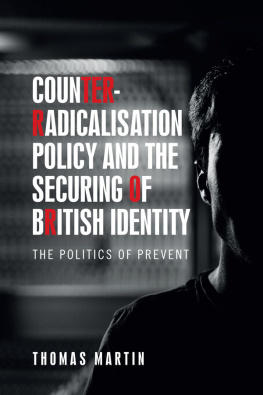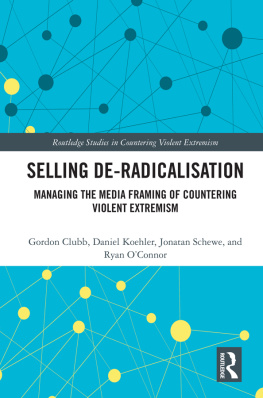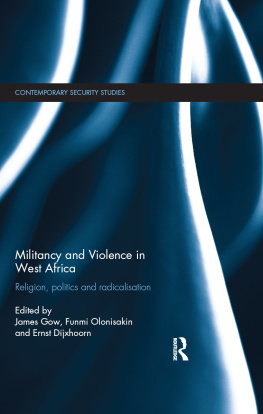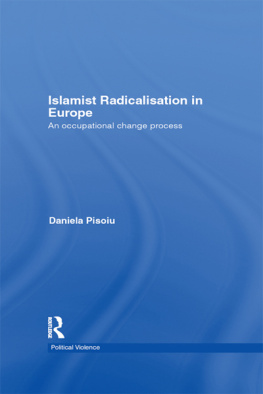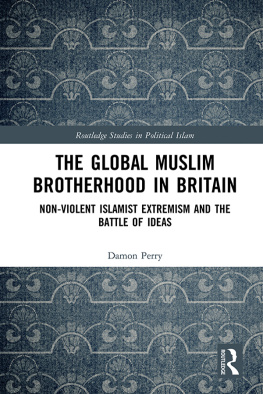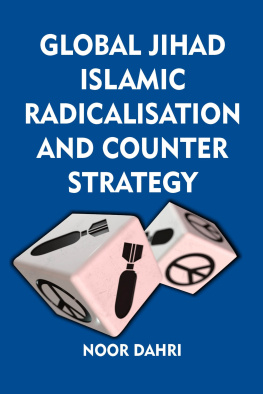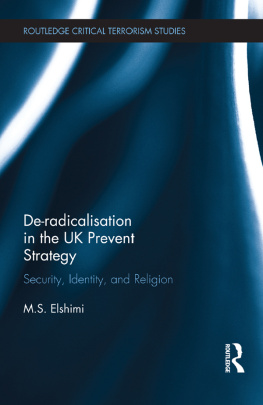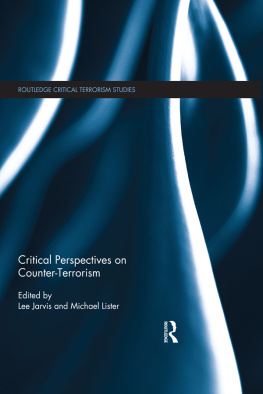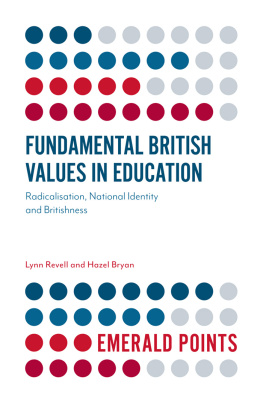Counter-radicalisation policy and the securing of British identity
Counter-radicalisation policy and the securing of British identity
The politics of Prevent
Thomas Martin
Manchester University Press
Copyright Thomas Martin 2019
The right of Thomas Martin to be identified as the author of this work has been asserted by him in accordance with the Copyright, Designs and Patents Act 1988.
Published by Manchester University Press
Altrincham Street, Manchester M1 7JA
www.manchesteruniversitypress.co.uk
British Library Cataloguing-in-Publication Data
A catalogue record for this book is available from the British Library
ISBN 978 1 5261 4008 1 hardback
First published 2019
The publisher has no responsibility for the persistence or accuracy of URLs for any external or third-party internet websites referred to in this book, and does not guarantee that any content on such websites is, or will remain, accurate or appropriate.
Typeset by Newgen Publishing UK
Contents
This research would not have been possible without the generous support provided by the Economic and Social Research Council. I am thankful that it is still possible to acquire research funding for critical inquiry such as this.
This research benefitted greatly from the interviews that I was able to undertake with many of those responsible for the Prevent policy. While I did not cite them all directly in the text, they were of incomparable help, shaping my thinking on the policy. I am deeply grateful to all of those who gave up their time to talk with me on this subject.
Special thanks are due to Stefan Elbe and Shane Brighton for their assistance with the research. Without their insight and generosity, this would have been a much weaker piece of work.
I would like to thank all the staff at Manchester University Press, and especially my editor, Robert Byron, for their expertise and assistance, and for making the publication of this book a real pleasure.
Finally, none of this would have been remotely possible without the love and support of my family and friends. My eternal thanks to my parents, Caroline and Clive, and my brother, Luke. I have been immensely fortunate to have such kind and generous parents. Thanks are also due to Leo and Dave for putting up with me for so many years.
Lastly, my darling Rebecca. You continue to amaze and inspire me.
During the course of this research, I was fortunate enough to interview many key figures who played a part in the making of the Prevent policy. I am extremely grateful for their time.
Many of those interviewed have held a number of different roles. I have noted here only those positions that were of direct relevance to this book. Some interviewees preferred for their contributions to the research to be anonymised. I have included here the term by which they will be referred in the text, to give an indication of the scope of the research.
| Hazel Blears | Minister of State for Policing, Security and Community Safety (20036); Secretary of State for Communities and Local Government (20079) |
| Professor Ted Cantle | Author of the Cantle Report for the Home Office in 2001 and Founder of the Institute of Community Cohesion |
| Lord Carlile of Berriew | Independent Reviewer of Terrorism Legislation (200111) and provided independent oversight of the 2011 Prevent Review |
| Charlie Edwards | Deputy Director for Strategy and Planning in the Office for Security and Counter Terrorism (200911), responsible for the development of CONTEST 2011 and for independent oversight of the Prevent Review |
| Sir Peter Fahy | Chief Constable of Greater Manchester Police (200815) and Prevent Lead for the Association of Chief Police Officers (201215) |
| Robert Lambert | Head of Muslim Contact Unit within the Metropolitan Police (20027) |
| Tony McNulty | Minister of State for Security, Counter Terrorism and Policing (20068) |
| Baroness Pauline Neville-Jones | Minister of State for Security and Counter Terrorism (201011) |
| Jacqui Smith | Home Secretary (20079) |
| John Wright | National Coordinator for Prevent within UK Police Service (200713) |
Official within the Muslim Council of Britain
Senior Civil Servant
Senior Council Official with responsibility for Prevent delivery
Senior Official at the Office for Security and Counter Terrorism
Senior Researcher in a Public Policy Think Tank
| ACPO | Association of Chief Police Officers |
| DCLG | Department for Communities and Local Government |
| DCSF | Department for Children, Schools and Families |
| DfE | Department for Education |
| MHCLG | Ministry of Housing, Communities and Local Government** |
| MCB | Muslim Council of Britain |
| MCU | Muslim Contact Unit |
| NPCC | National Police Chiefs Council* |
| Ofsted | Office for Standards in Education, Childrens Services and Skills |
| OSCT | Office for Security and Counter-Terrorism |
| PVE | Preventing Violent Extremism |
| WRAP | Workshop to Raise Awareness of Prevent |
The National Police Chiefs Council was established on 1 April 2015, replacing the Association of Chief Police Officers.
The Department for Communities and Local Government was renamed and made a ministry on the 8 January 2018, becoming the Ministry of Housing, Communities and Local Government.
The Department for Education was formed on 12 May 2010, replacing the Department for Children, Schools and Families.
The Trojan Horse scandal
On 27 November 2013, a letter was allegedly discovered in a school in Birmingham. The concerned member of staff sent it to the Leader of Birmingham City Council, Sir Albert Bore. While of questionable authenticity, it contained the details of a plot termed by those involved as Trojan Horse. The alleged plotters stated in it, [w]e have an obligation to our children to fulfil our roles and ensure these schools are run on Islamic principals [sic] (Clarke, ). While the original letter is widely considered to be a hoax due to factual inaccuracies, it was understood to reflect practices that had been seen in some Birmingham schools, detailing how to install new governors sympathetic to the Islamic faith, and how to undermine uncooperative head teachers. Later it became apparent that the DfE had been previously warned in 2010, by a senior Birmingham head teacher, that issues of the nature reported in the Trojan Horse letter were a concern to some in the city.
Upon being leaked to the press, the story prompted numerous headlines and a flurry of activity. Over the course of the next two years, a number of investigations were launched to ascertain whether the activities cited in the letter had credibility, and what lessons needed to be learnt. The Office for Standards in Education, Childrens Services and Skills (Ofsted) inspected twenty-one schools, fifteen of which were at the express behest
The reason for this activity is a set of concerns, drawn from the original Trojan Horse letter, that these schools were promoting a conservative, Islamic ethos and were distancing themselves from mainstream British society. At one level, this is a question of how much leeway state-maintained schools should have in their curricula, and how schools servicing ethnic minority students should support the cultural and religious beliefs of those communities. Yet these investigations go far beyond mere questions of pedagogy. At stake within the Trojan Horse scandal is a novel question: has this promotion of an Islamic culture, and this distance from British values, engendered within these children a vulnerability to radicalisation? This question links security and identity in important and novel ways. Trojan Horse was not a scandal because of the identification of terrorists or the promotion of terrorism. It was a scandal because the conservative Islamic environment allegedly fostered within these schools, and the distance this created from mainstream British values, was understood to

